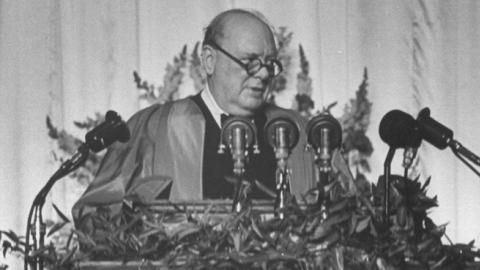Seventy years ago this past weekend an elderly, rotund man stepped up to a podium in Fulton, Mo., and delivered one of the great speeches of the 20th century — and arguably the single most relevant speech for our own time.
The man was Winston Churchill, and the speech he gave on March 5, 1946, has been known ever since as the Iron Curtain speech, both because it coined a phrase — “from Stettin in the Baltic to Trieste in the Adriatic an iron curtain has descended across the Continent’’ — to describe the inexorable advance of Josef Stalin’s Communist empire in the aftermath of World War II, and because Churchill had summed up the ideological, as well as the geopolitical map, of the Cold War world for the next 45 years.
Certainly it was a prescient moment. In March 1946 many in the United States, including in the Truman administration, still believed the cooperation with the Soviet Union that had won World War II would blossom into permanent friendship.
Churchill knew better. Even before the Berlin blockade and Communist coups in Czechoslovakia and Hungary finally awoke the apathetic and the gullible to Stalin’s true designs, Churchill saw that the struggle between freedom and tyranny would continue after the fall of Nazi Germany and Imperial Japan — because that struggle is perpetual and unending.
The fundamental question he raised that day in Fulton was: On which side would the United States take its stand? Would America choose retreat and disengagement in the face of tyranny, as it had after World War I — thus setting the stage for an even bloodier and more destructive Second World War? Or would the United States choose engagement and the defense of freedom, together with its democratic allies?
As the most powerful nation on earth, as Churchill noted, America’s choice in 1946 mattered profoundly. Today, 70 years later, the answer to that question still matters.
For the past seven and a half years, the Obama administration has chosen retreat. As good leftists, Obama and his team decided that there was really was no significant moral difference between how the United States practiced freedom and how others waged tyranny. To some, America had been the Cold War’s real “evil empire” Winston Churchill envisioned in Fulton. And then — after the breakup of the Soviet Union — the United States continued its disruptive role by invading of Iraq.
Starting in 2009, American disengagement and retreat had to be the order of the day — for the world’s sake, if not ours (or so went the argument). And although the result might be chaotic at first, out of the chaos a new, more equitable world order would blossom.
Now we know better. We’ve seen that chaos breeds more chaos, and tyranny more tyranny. That was Churchill’s point. Seventy years ago, Churchill understood that if the United States chose disengagement and retreat, then tyranny would prevail not only in Europe but around the world.
What made America great, and still does, is its role as the protector and advocate of freedom.
But if America chose engagement and stood up for the universal principles of the Declaration of Independence — that “the people of any country have the right, and should have the power by constitutional action,” in Churchill’s summation, “to choose and change the character or form of government under which they live” while also enjoying freedom of speech and the rule of law — then freedom would have a chance, as would peace and prosperity, around the world.
In 1946, even after sacrificing 400,000 men in the destruction and carnage of World War II, America wound up making the right choice. And after 1980, in the shadow of Vietnam, Ronald Reagan renewed that choice and eventually won the Cold War. Seventy years later, we need to make the right choice again.
There’s a lot of noise right now about making America great again — after seven years of Obama, it’s understandable. But it’s important to remember that what made America great, and still does, is its role as the protector and advocate of freedom. That’s what Churchill impressed on us in 1946 with profound clarity. It’s what our current crop of presidential candidates need to recognize and make part of their message to the American electorate — and to the world.















